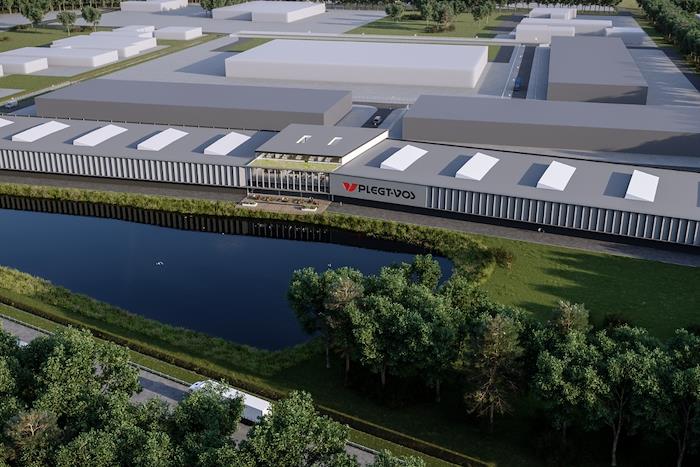In short
- The construction of business park Twente in Almelo will start this month. The first hall on this nine-hectare site will house a series of robots from construction company Plegt-Vos, and they will produce between 1,300 and 2,000 facades a year.
- Innovative production methods require different skills: engineers and operators are welcome at the construction company.
Global Goal

“We already robotised part of our work in Langeveen in 2006, where we also have a branch. However, there was no room for expansion. We chose this site because both Plegt-Vos and I have roots in Twente and because there are nine available hectares for us here in Almelo. We will be able to expand and stay here for a long time.”
This factory will soon start producing facades. For Flats, terraced houses, semi-detached houses and detached houses. But these facades will not be uniform, according to Opdam, because robotisation allows for much variation. “If it is technically possible, we will be able to make it”, he says. “We already have 101 different designs. I just want to point out that the Netherlands will not look the same everywhere because of this development. Architects can do whatever they want, which is exactly what our customers want.”
Related article
“The expectation is that around one million homes will have to be built within ten years if we want to reduce the housing shortage. This cannot be done by continuing to build in a largely traditional way. You have to look, think and act differently. We have done that and found a solution in robotised production. This new way of working offers plenty of opportunities for the region as well. We have a strong industrial sector in Twente, and we are also strong in logistics and construction. Plegt-Vos builds everywhere in the Netherlands, but the supply, the people and the knowledge will be from Twente.”

This development will change the way of working on a construction site. “The traditional construction industry will not disappear for a while, so there will always be work for professionals”, says Opdam. However, how Plegt-Vos will be operating, starting next year, requires other skills. Engineers and operators will then be able to work in Almelo. Opdam estimates that fifty per cent of the building components that Plegt-Vos produces for housing corporations, project developers and various care organisations will be made in the factory as of next year. “This is very necessary”, he says, referring to the reasons why his company started this project.
Opdam predicts that the high-tech manufactured facades from Almelo and the parts that are already being produced in Langeveen will be of better quality than those built traditionally. He explains: “The conditions are optimal. Human error is out of the question, and it is important that the facades are made under the right climatic conditions. We don’t have to deal with moisture, for example. Or with frost, which brings traditional construction to a halt. We can just keep on going in the factory.”
Starting next year, Plegt-Vos expects to deliver around 1,300 homes per year using this method, scaling up to 2,000 per year. In other words, a considerable contribution from Twente to solving the current housing shortage.
Date: 9 March 2021 |
Source of tekst: Plegt Vos |
Author: Maaike Thüss





